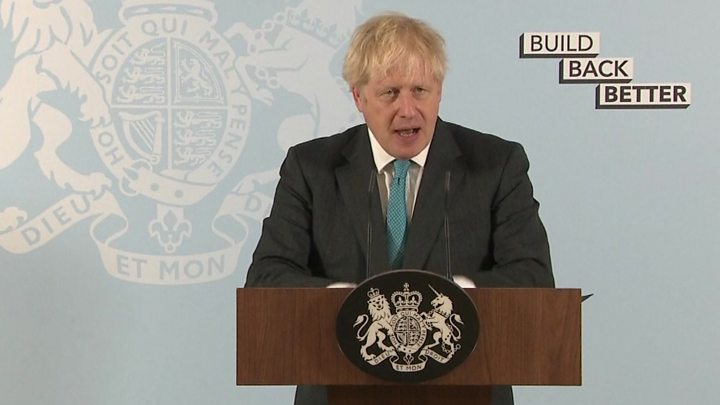It was a whirlwind week for the UK economy, with Britain sealing its first post-Brexit trade deal with Japan, the pound taking a beating and gross domestic product (GDP) slowly rebounding in July.
Here’s all you need to know about all the major events and the state of play of the UK economy.
In a positive uptick, the latest figures from the Office for National Statistics (ONS) showed that Britain’s economy continued to rebound in July, from the deepest recession on record, following the coronavirus crisis.
The data showed that GDP grew by 6.6%, signalling the third consecutive month of expansion. GDP measures the total value of services and goods produced in the UK.
Growth in the UK’s biggest sector, services, came in at 6.1%, lower than the 7% expected by analysts in a Reuters poll.
However, other parts of the economy saw rapid expansion in July. Construction output rose 17.6% and manufacturing output rose by a better-than-expected 5.2%.
Previously, in the second quarter, GDP fell by 20.4% between April and June — the largest ever quarterly retraction since records began in 1955, throwing the UK into a recession.
Continuing the good news, Britain also signed a free trade agreement (FTA) with Japan, its first ever post-Brexit deal after months of negotiations.
The deal was sealed on principle, during a video call between the UK’s international trade secretary Liz Truss and Japan’s foreign minister Motegi Toshimitsu.
The FTA with Japan will see tariff-free trade on 99% of UK exports to the country, with officials predicting a £1.5bn ($1.9bn) boost to the UK economy “in the long run.”
Truss said: “The agreement we have negotiated – in record time and in challenging circumstances – goes far beyond the existing EU deal, as it secures new wins for British businesses in our great manufacturing, food and drink, and tech industries.”
Meanwhile, business leaders welcomed the “breakthrough” with Carolyn Fairbairn, director-general of the Confederation of British Industry, noting, the deal will be “welcomed by businesses across the country.”
A free trade agreement between the two nations could increase the UK trade to Japan by about £15bn a year.
Despite good news elsewhere, everything wasn’t rosy for Brexit. The pound had a tumultuous week, dropping to six-month lows against the euro and sliding sharply against the US dollar following a breakdown in Brexit talks between the UK and the EU.
On Friday, sterling was down 0.2% against the euro (GBPEUR=X) to €1.0789 by late afternoon in London and was down 0.1% against the dollar (GBPUSD=X) to $1.2779.
The pound had sold off sharply against both pairings on Thursday, after the EU threatened to walk away from Brexit talks, after the UK said it could renege on parts of the Withdrawal agreement.
The effects of the coronavirus pandemic continue to be felt by the aviation industry, with British Airways (BA) owner IAG (IAG.L) announcing 87,000 more jobs could be lost if the government keeps travel quarantines in place till Christmas. The restrictions could cause a £4.6bn hit to the UK economy, airline leaders have warned.
BA is currently in the process of reducing its overall staff numbers by 13,000. By the end of August, more than 8,200 BA employees had already lost their jobs as part of a restructuring launched in the wake of the COVID-19 crisis.
On Thursday, the airline announced its set to raise £2.5bn through a heavily discounted rights issue.
On Friday, the chief executive of Heathrow also warned that thousands of jobs could be at risk when the government’s furlough scheme comes to an end in October.
The warning came as Heathrow announced that passenger numbers in August dwindled 81.4% compared to the same month in 2019. Just 1.4 million people passed through the airport last month.
Earlier this week, John Lundgren, the CEO of easyJet (EZJ.L) criticised the government over how it handled the coronavirus pandemic. It comes as the budget airline announced it would cancel flights in response to the latest UK quarantine measures imposed on seven Greek islands.
Ludgren said that he was “frustrated” with the government’s “unpredictable” quarantine measures.
EasyJet also warned it would fly fewer than expected passengers in the coming months as a direct result of the UK’s latest quarantine measures in Greece. Announcing it would not give investors any guidance on its financial performance for the rest of this year and next, blaming “the lack of visibility and the continued level of uncertainty.”
British shopkeepers have urged the government to do more to get the public back into the office, warning that many stores will go bust if normal working patterns don’t resume.
Helen Dickinson OBE, chief executive of the British Retail Consortium (BRC), said on Tuesday: “Unless businesses and government can successfully persuade office workers back into city and town centres, some high street retailers will be unable to afford their fixed costs.”
Over the last couple of months, major high street employers like Boots, Marks & Spencer (MKS.L), and Dixons Carphone (DC.L) all announced thousands of job cuts and store closures, blaming diving sales. Thousands of jobs have also gone at takeaway chains like Pret and Costa.
Meanwhile, a group of MP’s have called on chancellor Rishi Sunak to mull extending the furlough scheme for struggling British industries. The warning comes as the Treasury Select Committee on Thursday published its second report into the economic effects of the coronavirus crisis. The report focused on the challenges facing the UK as it enters its economic recovery phase.
“The chancellor should carefully consider targeted extensions to the Coronavirus Job Retention Scheme and explain his conclusions,” Tory MP Mel Stride, chair of the Treasury Select Committee, said in a statement.



More Stories
Britain’s TSB axes 164 branches and around 900 jobs
KPMG is laying off 1,400 US workers, cutting some tax employees’ pay
Oil Refiner Marathon Says 12% of Workforce Affected in Cull